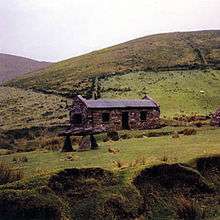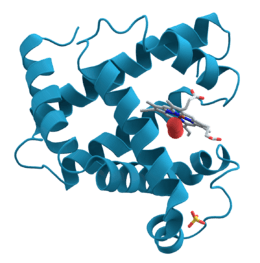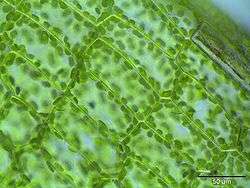
The Cell
The Cell is a 2000 American psychological thriller film directed by Tarsem Singh, and starring Jennifer Lopez, Vince Vaughn and Vincent D'Onofrio It received mixed reviews upon its release with critics praising the visuals, direction, make up, costumes and D'Onofrio's performance but commented on the Silence of the Lambs inspired plot, the emphasis on style rather than substance and the somewhat masochistic images. The film marks the directional debut of Tarsem Singh.
Plot
Child psychologist Catherine Deane (Jennifer Lopez) is an expert in an experimental treatment for coma patients: a virtual reality device that allows her to enter into the minds of her patients and attempt to coax them into consciousness. When serial killer Carl Rudolph Stargher (Vincent D'Onofrio) falls into a coma before the FBI can locate his final victim, Agent Peter Novak (Vince Vaughn) persuades Deane to enter Stargher's mind and discover the victim's location. Stargher's victim is imprisoned in a cell in the form of a glass enclosure that is slowly filling with water by means of an automatic timer.

Glasgow Monday
Glasgow Monday is the 47th release, third live album, and second-ever double album release, from avant-folk/blues singer/songwriter Jandek. It is his fifth release of the year (counting the DVD version of Glasgow Sunday) and features "The Corwood Representative" on piano and vocals, along with the same rhythm section he performed with at the shows documented on Glasgow Sunday and Newcastle Sunday, bassist Richard Youngs (playing upright bass) and drummer/percussionist Alex Neilson who accents the music with chimes and echoing percussion. It was recorded live at the Center for Contemporary Arts in Glasgow, Scotland on May 23, 2005 and features a prelude and nine parts to a single song, "The Cell".
Track listing
"The Cell"
Disc one
Disc two

Cell (novel)
Cell is an apocalyptic horror novel published by American author Stephen King in 2006. The story follows a New England artist struggling to reunite with his young son after a mysterious signal broadcast over the global cell phone network turns the majority of his fellow humans into mindless vicious animals.
Plot
Clayton Riddell, a struggling artist from Maine, has just landed a graphic novel deal in Boston when "The Pulse", a signal sent out over the global cell phone network, suddenly turns every cell phone user into a mindless zombie-like killer. Clay is standing in Boston Common when the Pulse hits, causing chaos to erupt around him. Civilization crumbles as the "phoners" attack each other and any unaltered people in view.
Amidst the chaos, Clay is thrown together with middle-aged Tom McCourt and teenager Alice Maxwell; the trio escapes to Tom's suburban home as Boston burns. The next day, they learn the "phoners" have begun foraging for food and banding together in flocks. Clay is still determined to return to Maine and reunite with his young son, Johnny. Having no better alternatives, Tom and Alice come with him. They trek north by night across a devastated New England, having fleeting encounters with other survivors and catching disturbing hints about the activities of the phoners, who still attack non-phoners on sight.

Cell biology
Template:Cell (biology)
Cell biology (formerly called cytology, from the Greek κυτος, kytos, "vessel") and otherwise known as molecular or cell biology, is a branch of biology that studies the different structures and functions of the cell and focuses mainly on the idea of the cell as the basic unit of life. Cell biology explains the structure, organization of the organelles they contain, their physiological properties, metabolic processes, signaling pathways, life cycle, and interactions with their environment. This is done both on a microscopic and molecular level as it encompasses prokaryotic cells and eukaryotic cells. Knowing the components of cells and how cells work is fundamental to all biological sciences it is also essential for research in bio-medical fields such as cancer, and other diseases. Research in cell biology is closely related to genetics, biochemistry, molecular biology, immunology, and developmental biology.
Internal Cellular Structures
Chemical and Molecular Environment

Cell (biology)
The cell (from Latin cella, meaning "small room") is the basic structural, functional, and biological unit of all known living organisms. A cell is the smallest unit of life that can replicate independently, and cells are often called the "building blocks of life". The study of cells is called cell biology.
Cells consist of cytoplasm enclosed within a membrane, which contains many biomolecules such as proteins and nucleic acids. Organisms can be classified as unicellular (consisting of a single cell; including bacteria) or multicellular (including plants and animals). While the number of cells in plants and animals varies from species to species, humans contain more than 10 trillion (1013) cells. Most plant and animal cells are visible only under the microscope, with dimensions between 1 and 100 micrometres.
The cell was discovered by Robert Hooke in 1665, who named the biological unit for its resemblance to cells inhabited by Christian monks in a monastery.Cell theory, first developed in 1839 by Matthias Jakob Schleiden and Theodor Schwann, states that all organisms are composed of one or more cells, that cells are the fundamental unit of structure and function in all living organisms, that all cells come from preexisting cells, and that all cells contain the hereditary information necessary for regulating cell functions and for transmitting information to the next generation of cells. Cells emerged on Earth at least 3.5 billion years ago.

Outline of cell biology
The following outline is provided as an overview of and topical guide to cell biology:
Cell biology – A branch of biology that includes study of cells regarding their physiological properties, structure, and function; the organelles they contain; interactions with their environment; and their life cycle, division, and death. This is done both on a microscopic and molecular level. Cell biology research extends to both the great diversities of single-celled organisms like bacteria and the complex specialized cells in multicellular organisms like humans. Formerly, the field was called cytology (from Greek κύτος, kytos, "a hollow;" and -λογία, -logia).
What is cell biology?
Cell biology can be described as all of the following:
- Branch of natural science – The branch of science concerned with the description, prediction, and understanding of natural phenomena based on observational and empirical evidence. Validity, accuracy, and social mechanisms ensuring quality control, such as peer review and repeatability of findings, are among the criteria and methods used for this purpose.
- Branch of biology – The study of life and living organisms, including their structure, function, growth, evolution, distribution, and taxonomy.
Podcasts:
The Cell
ALBUMS
- Are You Ready released:
The Cell
ALBUMS
- Erratic Distortion released: 2006
- Twilight Children released: 2006
-
by Autumn's Grey Solace
-
by Erykah Badu
-
by Assailant
-
by Red Paintings
-
by Butterfly Effect
-
by The Butterfly Effect
The Cell
by: Autumn's Grey SolaceDeny all that is so wrong
It's true
The guilt's in your hands
Follow me follow
I'll lead you away from your cell
If anyone knew you
They wouldn't believe in all they've seen
Monsters within you must never continue
To breathe
So watch me as I leave
And see how it could be
To taste the world again
Suddenly I realize
That I'm just as lonely
Ashamed of never being wanted
What if I knew what it's like for you?
Fathom me fathom
And maybe you'll see I'm your fear
The fever is so high and now I can see why
You're so mean
Feeling tomorrow will leave you in sorrow
Alone
For I will be weary of you feeling sorry
For your own self
Morning I'll see you fall
Down where you ought to have known
Blame the law you broke

